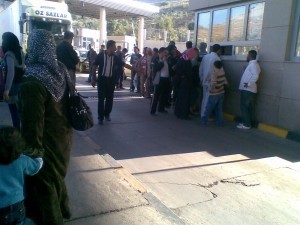Bab Al-Hawa: Legal Smuggling

Rasha Rami
I spent 17 hours with my family at the Bab Al-Hawa border crossing, but it felt like a lifetime. After crossing legally into Turkey, our three-month visa had ended, and so we were forced to return to the crossing in order to renew our papers. But according to a new Turkish law, no one is allowed to renew their three-month stay unless they leave the country for another three months before returning.

Under normal circumstances, there is nothing unusual in this rule, but for us refugees who were forced to leave Syria because of the war and have no place else to go, it is an unjust law.
As we waited at the crossing, trying to get back into Turkey, we stood with dozens of others in segregated lines – one for men and one for women – hoping the commanding officer stamping passports would take pity on us. He sat in his comfortable chair in the centre of the room looking at us with clear disdain. He would leave for hours at a time to get a drink of water, smoke a cigarette, or chat with one of his friends without appearing to feel any guilt over the dozens of people whose fate and security depended upon his stamp. It was well known that the crossing was run according to the whims of the security personnel, who would suddenly decide to close the gates, forcing the Syrians to sleep in the woods until the next day.
As we waited in line, a man approached my brother and told him he could secure our crossing after the officer refused to stamp our passports. The man was called Abu Suleiman and had a Turkish passport. He called himself a “border simsar,” a middleman.
He told us we would have to stay on the Syrian side of the border in order to smuggle us across later after coming to an agreement with the border officials. It would cost 50 Turkish Lira (about 28 US dollars) per person.
Allowing Abu Suleiman to smuggle us across was the only way to return to Turkey, so we stayed on the Syrian side of the border, which is controlled by the Free Syrian Army, FSA, and some Al-Qaeda elements. Between the armed groups and the families waiting to know their fate, one feels as though one is in a foreign country, far from Syria and unlike any other known land.
I listened to children and teenagers discussing how many of their family members had been killed, wounded or arrested, comparing the number of burned-out tanks they had seen along the road and the state of the decomposing bodies. It was as if they were competing to see who knew the most about war and death; they did not bat an eye when talking about a body or a massacre.
“Four people from my family were killed by snipers,” said Iman, a 10-year-old girl from Idlib. “I am not sad for their deaths, but I am sad because I didn’t know how to save them. That’s why I’ve decided to become a nurse when I grow up; everyone says the war will not end quickly, so I will be able to save others.”
Iman is not the only one who has decided her life’s course after narrowly escaping with it. Abdel Salam, age 9, said he wants to join the FSA when he turns 15.
“Most of my relatives have taken up arms and I, too, want to protect my mother and siblings from the explosive barrels being dropped at us,” he said.
These dreams, devoid of childhood innocence, are complicated compared to those of their families, who seek nothing more than a safe roof over their heads.
The Journey Back
After about seven hours waiting inside Syria, Abu Suleiman came to take us on his daily, unofficial journey across the border. We split into two groups at the main gate of the Turkish crossing as the “simsars” shouted their services at the top of their lungs, and well within hearing of the Turkish soldiers: “smuggling taxis!”; “unofficial entry!” The first group, comprised of four young men, a woman and two children, went across.
My family and I were in the second group. We went with Abu Suleiman directly to the Turkish gate as the Turkish officers watched us as if nothing out of the ordinary were happening. At the gate, one of the officers stopped us to inspect our passports. Abu Suleiman told him that we would bring our car from the Turkish car park to go into Syria.
“If they didn’t come back, it is you who will pay me the fine for them,” the officer told Abu Suleiman, laughing. He then wished us luck in our new lives and let us cross. Just ten minutes later we were inside Turkish territory, although it felt to us like hours.
The other group and our own were able to cross safely into Turkey; Abu Suleiman said he smuggles six to ten people a day.
Now, in order to settle our affairs, we must leave Turkey once more after three months and attempt to enter legally. I do not know how many times we will have to do this if we are unable to secure a long-term residency in Turkey, nor do I know how many other families must endure the same ordeal.
